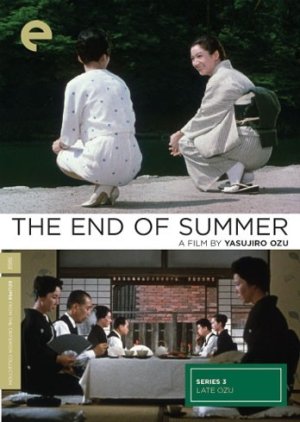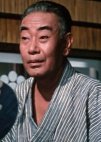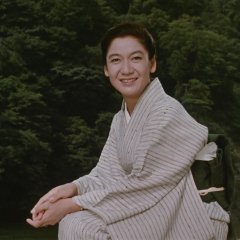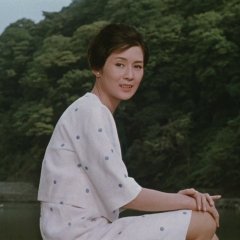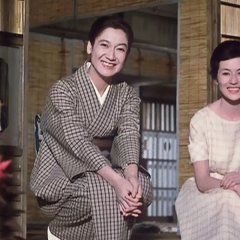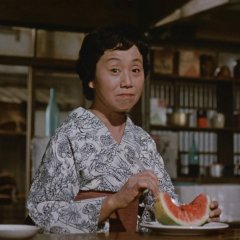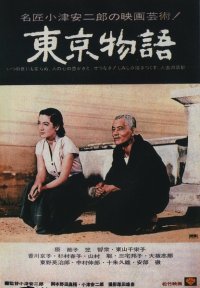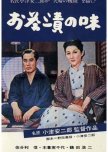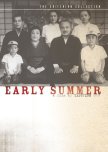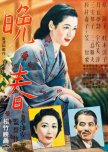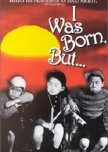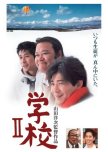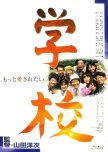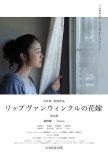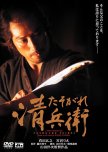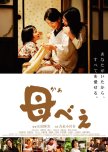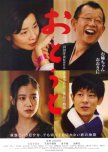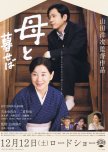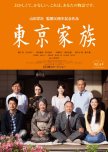The family of an older man who runs a small sake brewery become concerned with his finances and his health after they discover him visiting an old mistress from his youth. Edit Translation
- English
- magyar / magyar nyelv
- dansk
- Norsk
- Native Title: 小早川家の秋
- Also Known As: Kohayagawa-ke no aki , Family Kohayagawa's Autumn
- Screenwriter & Director: Ozu Yasujiro
- Screenwriter: Noda Kogo
- Genres: Comedy, Drama
Cast & Credits
- Hara SetsukoAkikoMain Role
- Tsukasa YokoNorikoMain Role
- Aratama MichiyoFumikoMain Role
- Nakamura Ganjiro IIKohayagawa ManbeiMain Role
- Takarada AkiraTeramoto TadashiSupport Role
- Shirakawa YumiNakanishi TakakoSupport Role
Reviews

"Is this it? Is this really it?"
“Life is a running stream, forever changing.” Ozu Yasujiro once again examined how the world was ever changing and its effect on the individual and family dynamics. In his penultimate film, The End of Summer, a care-free father who does what he wants regardless of public opinion causes headaches for his family.“With so many captains, this ship will end up in the mountains!”
Manbei is a widower and owner of a small sake brewery that is beginning to fail. He spends most of his time disappearing during the day which causes consternation for his family and employees. Turns out he is seeing an old mistress again. Aside from his day pleasures and business concerns, the family is also trying to match-up Akiko, his widowed daughter-in-law, and also his younger daughter Noriko. Neither woman is receptive to the overtures of the men provided. Akiko is happy as she is with her young son. Noriko is in love with an assistant professor who moved away. Fumiko is the daughter who chastises the father for seeing the woman who had made her mother cry when she was alive. Manbei possibly has another daughter by the mistress though he is the only one who believes that. Yuriko’s only interest in Manbei as a potential father is securing a mink stole from him. Everything is fun and games until Manbei suffers a heart attack one evening which draws the family together.
“He did as he pleased his whole life…but he was also quite happy. It’s a rarity these days.’”
While the rapscallion of a father led his family on a merry chase, it was the sisters-in-law who captured my attention. Ozu made no moral judgements on the promiscuous head of the family but I found his childish behavior tiring. Akiko and Noriko (familiar Ozu names) had one of the most beautiful bonds in filmdom. Akiko gave Noriko advice on life and relationship matters. Akiko told Noriko when considering a husband, that character was more important than conduct, conduct could be changed but character couldn’t. Noriko wouldn’t allow Akiko to speak poorly of herself, charging her 100 yen every time she referred to herself as old. At the mother’s memorial service, they walked by the water and gracefully squat to talk perfectly in sync. Near the end of the film in a solemn moment they did the same thing. Despite being told differently by everyone else, the two mirror the father’s life philosophy and chose the paths that were right for them.
“I do miss the old days”
The changing world also crept into Ozu’s style with flashing neon lights used in several scenes. Instead of the rectangular imagery often used, the circular sake barrels were reflected in much of the family’s décor. Music and names in his movies were often repetitive as if they were barely an afterthought. In this film he used the composer from Good Morning. Though slightly more intrusive, it was mostly limited to transitions between scenes. Bird songs, crickets, and rhythmic drumming filled most scenes as characters talked with each other in their carefully composed settings. In two critical scenes, the faint whistle of the trains he loved could be heard. It was time for a long trip for one of the characters.
“Destiny is a strange thing.”
The ending of the film was darker and more somber than most Ozu films. Crows and the crematorium smokestack dominated the scenes with a couple of farmers ruminating on the cycle of life. Perhaps Ozu was contemplating his own death more. His mother died in the same year this film came out and he would die of throat cancer in 1963. That’s not to say the film was downbeat. Manbei provided humorous hijinks and the sisters-in-law provided a warm united front as they mapped out their own futures. The End of Summer provided a curious mix of humor and pathos with the scales carefully balanced in Ozu’s favor.
11 April 2024
Was this review helpful to you?

"I'm happy as I am"
Ozu's 2nd to last film, The End of Summer, starts off with a sign of changing times. We see neon lights in the nightlife of a city (Osaka it seems). One of the earliest scenes is in a posh cocktail bar. Despite these signs of 'modern' times at the time of the film (1961), Ozu brings us back to much of the classic or traditional cues his stories are primarily based in. The film takes place in classic looking towns with traditional style homes and clothing.With the End of Summer, we are treated to variations of Ozu themes yet again. Setsuko Hara plays the lead in Akiko, which was also the name of her character in the previous Ozu film, Late Autumn, but it is a different Akiko. There's another character in End of Summer, named Noriko, but it is not played by Setsuko. Ozu must have had a blast with vanilla characters and repeated names. It's as if he was saying it doesn't matter who the character is - their name, their role, their relationship - because what he wanted us to see was the common denominator of all these characters - the humanness.
Ozu films have this interesting juxtaposition of similar characters, plots (family themes), and storytelling mechanics. But the setting changes as the times change. It doesn't matter if we start off with silent films, then move on to black and white, then to color, or that it is pre-WWII or post WWII, or whatever else has changed in the external world; no, it doesn't matter because being human remains the same regardless of country, era, and place. Did neanderthals keep secrets from one another? I'd wager they did.
The similarity of Setsuko Hara's Ozu roles is not by mistake. She is not a one-note actress. Ozu purposefully keeps her character roles and temperaments limited. Hara's character Akiko, says "I'm happy as I am". It's a summary of all of Setsuko's Ozu characters. It's as if the character/Ozu are saying, "Let me stay this way in a world that is constantly changing; let me hold on to this beautiful moment, savor myself - my life- as it is right now; what more could I ask for in this life?". However, change indeed happens to us all, and keeping that happy moment forever with the accompaniments, companions, and scenes of that moment are impossible.
The music in this film was more experimental and versatile. It opens up with a Baroque music aesthetic. It certainly caught my attention more in this film compared to other Ozu soundtracks. However, some of the music is a bit jarring or doesn't quite fit the ambiance.
This film was solid, but it wasn't as emotionally impactful as other Ozu films. Many of the support roles felt insignificant or less compelling compared to other Ozu film characters. This film, while very visually stimulating, felt a bit tiresome in terms of plot and character development. There wasn't quite enough variation to Setsuko's role in this film and her character came across a bit bland. Still, it is a worthwhile film to watch for the veteran Ozu filmgoer.
Was this review helpful to you?
Recommendations
There have been no recommendations submitted. Be the first and add one.

